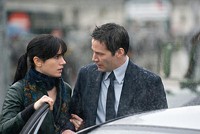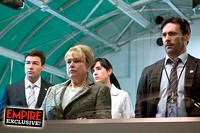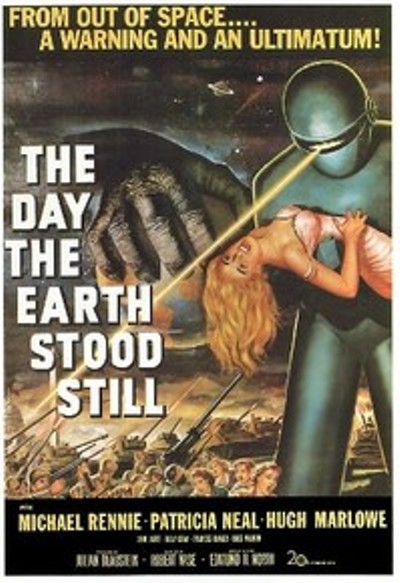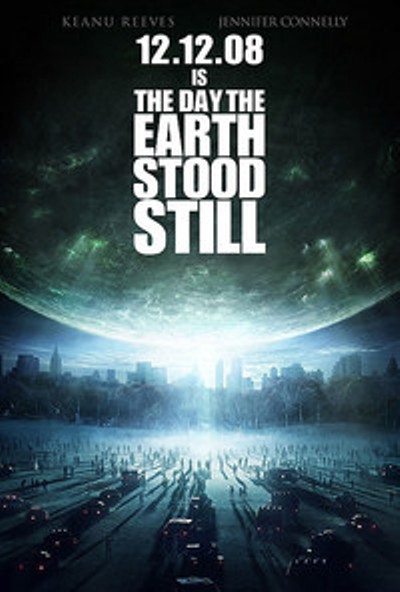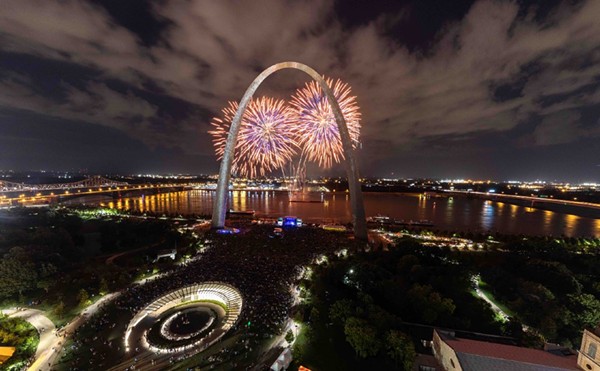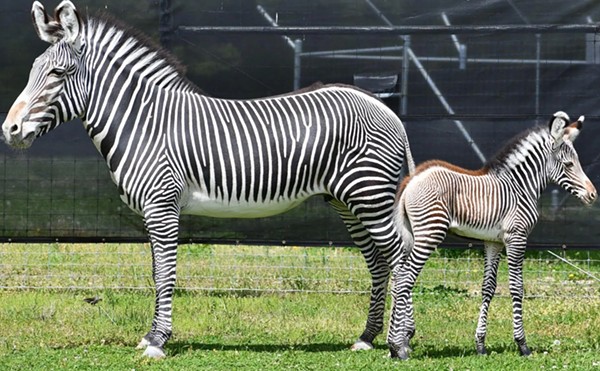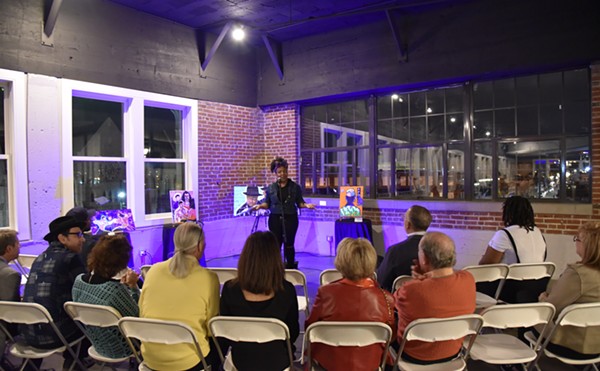You might remember The Day The Earth Stood Still as that hokey, if well-meaning, sci-fi message-movie from the 1950's. (And if you do remember it, chances are the title also describes the day you shouted ''Klaatu barado nikto!'' at your gym teacher.)
But for all those who haven't seen the original, or think it lacked explosions and/or terrorism subplots: Keanu Reeves, Jennifer Connelly and Jon Hamm have the new movie for you!
The new version of the old classic comes out Friday, and the RFT talked to the three about their roles. Watch as Keanu Reeves accidentally insinuates that he's 70 years old, Jennifer Connelly confirms her belief in aliens, and St. Louisan Jon Hamm (John Burroughs School, if you were wondering) holds his own amongst the rabble.
Had any of you seen the original prior to reading the script? What kind of response did it raise?
Jennifer Connelly: I'll start. I had not seen it prior to reading the script. Soon after reading the script, I watched it, and subsequently watched it many times -- I'm a big fan of it. I think it's a really great film. I think I'm not alone in feeling that. I think everyone involved in making the film really likes the original.
Keanu Reeves: I saw the film actually when I was probably like nine or ten. And the original, when it was made in 1950, released probably 1951, was in black and white. When I was a kid, I saw it on a black and white television. How about that? And I kind of remembered the spaceship, Gort, the alien coming to Earth, and the score -- the score of the film was very striking. It really had this kind of anxiety, this impending doom.
And then when I saw the film later in life, some of its kind of political context, some of its humor and irony, became much more apparent to me. I saw the film before I started production, and if you haven't seen it, I highly recommend it. What we tried to do with this film, Scott Derrickson, the director, was really kind of taking what was great about the first film, the original, and then really kind of updating it to our time.
(Connelly and Reeves / 20th Century Fox)
The original was designed to illustrate the fear and suspicion characteristic of the early Cold War period. Is this remake meant to characterize a more modern zeitgeist?
KR: Yeah. There's still that kind of military aspect. Obviously, the film looks at the kind of American militaristic response of shoot first, talk later. But also the film is kind of updated in the sense that it's not man-on-man. It's more about the human species and its relationship to the planet, and the kind of crisis crossroads that we're at. And the film is also in a way looking at our character, just as the first one was, looking at ourselves, who we are.
Keanu, you've done a lot of action/sci-fi movies. What is it about these types of movies that keep you coming back for more?
KR: Well, I love the genre. I grew up reading science fiction, watching science fiction films. I think it's a wonderful genre in the sense that it's a bit of a Trojan horse. Bit of drama, adventure -- it's also a great way to look at ourselves. It's a genre that beautifully talks about our hopes, our fears, our anxieties, utilizing allegory, metaphor, in such a fantastic way.
Jon, I know that you've done a lot of work in TV [as Don Draper in AMC's much acclaimed Mad Men], as well as movies. Now that you're a part of The Day The Earth Stood Still, do you think you're headed in the direction of more Hollywood blockbusters?
Jon Hamm: I don't know. It's not entirely up to me. Most of us have that situation, being actors that people tend to pick us for things. I would like to do things that I find interesting, and whether those opportunities come in television or film, it really depends upon the material. I've been very fortunate to do something on television that I really like, and find it incredibly interesting and thought-provoking and challenging as an actor. If those opportunities come in films, then I'd be happy to do those as well.
Jennifer, throughout your career, you have played roles that have an element of self-sufficiency and independence, recently Maddy from Blood Diamond. What draws you to these strong female characters?
JC: I have played a few women who are really a mess, frankly, as well. I did this film called House of Sand and Fog, and she [main character Kathy] was all sorts of bent out of shape, that woman. I think those characters are interesting as well. Personally, it's just as fun to play, whether they're well put-together humans, or capable or sort of falling apart. I'm sort of interested in human nature, all different kinds of people. I did like this woman and the things that she was had a lot of merit. She's bright, she's without prejudice, she's capable, she's educated, so she's certainly the kind of person that I have a lot of respect for.
What was the most difficult aspect about filming this movie for you?
JC: I had a great time, frankly. I think the things that are always difficult for me, just having expectations and feeling the pressure of wanting to serve the story well and fulfill my obligations as well as I possibly can. I feel that on everything that I do. Specific challenges to this film. It was kind of nice, actually. There were no big personality clashes. I liked everyone, had respect for everyone I was working with, I thought the film was sort of going well, I thought Scott was doing a great job, I thought all the cast was doing a great job. So, it was kind of weirdly pleasant and without controversy. The worst thing I had to deal with was like a little bit of green screen, where you're trying to pretend you're having this really frightening experience, but you're just looking at a green curtain with some pink tape on it, which is a little weird. Some rain machines, uncomfortable rain machines and weirdly large fans that was really the worst there was to deal with, frankly. It was a real pleasure.
KR: I think in terms of the challenges of this film probably would go mostly to the director, Scott Derrickson. He had to kind of direct this ship. He had decided to make a remake of an American classic. And he took that on, and he had a real strong point of view. He, as a person and as a director, was very practical, very open, very collaborative. So, he kind of set the tone for everyone in terms of being able to do their best and to have a real kind of positive experience. I think probably, as we all kind of sweated our roles, Scott Derrickson probably was the one who was in a cold sweat at night. "How do I do this film?" He really showed up and created a great place for all of us to do the best that we can. It doesn't always go like that, so it was kind of cool that it did.
JH: Being fairly new to this entire experience of making gigantic Hollywood movies, I was sort of equally surprised at how pain-free the whole experience was. It was pleasant. I obviously didn't have as much to do as these two, but I found everybody to be incredibly cool and friendly and respectful, which was a pretty awesome experience.
(Jon Hamm, far right / 20th Century Fox)
Jon, in shooting such a big explosive, intense special effects production like this, how has it been different from other projects that you've worked on? Did you have any new experiences on the set?
JH: Well, it's a matter of scale. Obviously, this is way bigger than a basic cable television show in the sense of budget and crew and effects and all that stuff, but one still approaches it the same way. You have to tell the story, and you have to be believable, and you have to be present. In that sense, it's still very small film-making, much like we do on [Mad Men.] Fundamentally, not much changes. It's mostly just scale that changes, and that can be kind of overwhelming, speaking from totally personal experience, but it can also be sort of intensely cool and eye-opening and exciting.
Do any of you believe that there are aliens or other forms of life out there?
JH: I believed it before doing a film like this, and I certainly haven't changed. I think that the numbers are such that there has gotta be. I just hope they're nice to us.
JC: I feel the same way. It didn't really affect my thoughts on it, which again, looking at the scale of universe, it makes good sense to me that there is probably something else out there. I think it's become sort of common thinking, and even my son was saying that astrobiology is now something that they're studying in school, and they're looking at Jupiter's moons and what may be under the ice, and it seems to me to make good sense.
What do you think will attract audiences to see this film?
KR: Well, where do I begin? Personally, I've seen the film, and to me, it's come to turn out how I hoped. It's a big idea film. It hopes to be enjoyable on a lot of different levels. I think it's a film you can take your kids to. It's a film that has something to think about. It's a big idea film. There are some great visuals, but it's also got some real, at the heart of it, personal relationships. Jennifer Connelly is playing a scientist and also a mother, a stepmother, to a young boy, and they have their relationship. She's lost a husband, he's lost his father. You kind of see this relationship. They're both in grief, and how is their relationship going to resolve? So, the film is trying to work on a bunch of different levels. It's kind of got big ideas, but it's also got smaller kind of human stories to it.
JC: I don't know of any other movies out there that are really like it, to tell you the truth. I think it brings more of the character of the original film, which was made in 1951, but I don't know of any other movies that are out there like it. I think there is something special about it in that way, the way that it is a big, exciting kind of spectacle of a movie. I think it fulfills the genre in that way. It's like you have your popcorn. It's thrilling. It's exciting. It's fun. But also, it's really responsible. I think it's also really resonant with things that are going on in the world today that people are talking about and are concerned about and maybe anxious about. I think it's a really nice balance, a really nice combination of elements.
It says you refer to the film as a re-imagining, rather than a remake. Are any of you cautious about doing remakes?
KR: In general, with any film, you have to ask why. And with a remake, especially a remake of a classic, that question might be in bolder letters. Scott Derrickson, the director, had a real line, and I think the story is a very contemporary story. It's about our relationship to each other. It's our relationship to the planet. And it's a film that has a real positive message about the human character, that in crisis, at a crossroads, we have the ability to change, and that the best of us can come out. That was kind of answering the why, the why to make this remake. But yeah, you definitely have to ask that question, and I think the film itself, The Day The Earth Stood Still, does lend itself to that opportunity because of its timeliness, and because of how that could be translated to present day, which maybe might not work so well for say, The Wizard of Oz.
JC: I think it depends on the film. I think this is a film that the people who know it tend to really love it, and it has a sort of classic status. I also talk to a lot of people who have never seen the film, which is different from a film like Wizard of Oz, where it seems like everyone has seen it. I hadn't seen it, and a lot of people haven't, I think. On that level, I think there is room to make another version of it. But I think it was just a really great story that's a great template, and I think it was very much a movie of its time. I think that no one was trying to fix that version. Everyone who worked on the movie loves the original version of it. It just seemed like it was a movie made that was very self-reflective at that time, and it was a commentary on what was going on then, and it seemed like a different set of issues and problems. We find ourselves in a different place. Filmmaking has come a long way in 57 years. It seemed like there was an opportunity to re-imagine it in a way that would have merit.
Jon, I hear you've got a planned multi-episode appearance on 30 Rock, and I know it's been rumored you'll be playing a possible love interest for Liz Lemon. Any juicy details?
JH: You've got all the information there. I play a person who moves into Liz's building, and we meet each other adorably, and hilarity ensues. Keep an eye out for it.
Finally, what do you hope audiences take away from the film? Any of you can answer.
KR: Well, we hope that people, obviously, enjoy the film. It hopes to entertain, but also to leave you with something to think about, and I think it's a film that has a real positive message and that people in these times that we're facing so many hardships and crisis, that there is a kind of hope, that we can do it.
JC: I felt that it was really uplifting as a film. Honest and truthful, gives this truthful view of what we're doing and how we're living and how we're treating each other and what's going with the planet. But I think at the end of the day, at the end of the film, I felt it was empowering in a way. I liked the way I felt when I finished watching the film.
JH: Well, I die in it, so I think it's awful.
The Day the Earth Stood Still opens Friday.

